
introducing readers to writers since 1995
February 25, 2008
Tom Dolby & David Levithan
![]()
Tom Dolby's The Trouble Boy and David Levithan's Boy Meets Boy came out within a year of each other, and about a year after that, the two debut authors realized they were fans of each other's work. (Well, Dolby already knew he liked Levithan's book, and then Levithan sent Dolby a fan letter.) They've both recently published new books—The Sixth Form for Dolby, and How They Met (a collection of stories about love, as opposed to "love stories") for Levithan. Dolby interviewed Levithan for GayWired earlier this month, but Levithan had some questions for Dolby as well, and here we are.
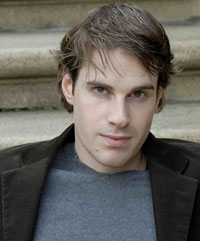 Tom Dolby: In the past week, I've been catching up on some of the other young adult books you've written: from Marly's Ghost to Nick and Norah's Infinite Playlist to Naomi and Ely's No-Kiss List, the last two of which you wrote with your friend Rachel Cohn. It's interesting because those are two very different types of books. Were they different in their conception? Did you always do the guy parts and Rachel did the girl ones?
Tom Dolby: In the past week, I've been catching up on some of the other young adult books you've written: from Marly's Ghost to Nick and Norah's Infinite Playlist to Naomi and Ely's No-Kiss List, the last two of which you wrote with your friend Rachel Cohn. It's interesting because those are two very different types of books. Were they different in their conception? Did you always do the guy parts and Rachel did the girl ones?
David Levithan: I think Nick and Norah was the more spontaneous of the two, because we didn't know what the hell we were going to do. We were just bouncing chapters back and forth. For Nick and Norah, we switched off girl-guy, but for Naomi and Ely, there are other characters, so it was every other chapter. I did Naomi's part once. We didn't plot it out. I would write my chapter, I would email it to her, and she would send me back her chapter. Not only did I not know what was going to happen, but I didn't even know who was going to be speaking. It was a different experience because Nick and Norah is so much about the chemistry between the characters while Naomi and Ely is the opposite of that—it's about two people who were really close who are falling apart.
So I have to ask you: I knew because of The Trouble Boy that you had a lot of teen fans. With The Sixth Form, were you conscious of thinking about teen readers being let in to a world that they might not have experienced? Sometimes adult books about teen characters are so awash in nostalgia and distance, but you really managed to make it feel contemporary. It had that ring of truth.
Continue reading "Tom Dolby & David Levithan"
August 24, 2007
TJ Fisher & Joshua Clark
![]()
A few months ago, I got hold of the galleys for Heart Like Water, a memoir by French Quarter Fiction publisher Joshua Clark of his experiences in the city during and after Katrina. I was immediately riveted by the raw emotional honesty and by Clark's rich sense of the absurd. Then, a few weeks later, Morgana Press sent me a copy of Orléans Embrace, a gorgeous coffee table book which combines a 1993 study of the Vieux Carré by Roy F. Guste, Jr., with reflections by TJ Fisher on the effort to preserve the city's unique legacy in the storm's aftermath. When I brought Fisher and Clark together by email, I had no idea it was going to turn into the biggest Author2Author feature yet, but these two survivors clearly had a lot to talk about!
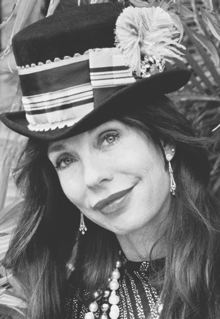 TJ Fisher: Louisiana, New Orleans, and the French Quarter in particular has always been an intriguingly ripe Mecca, a convergence point for writers and artistically creative persons of all types. Whether born here or transplanted, New Orleanians somehow instinctually understand that the age-old agonies and ecstasies of griefs and galas go hand-in-hand.
TJ Fisher: Louisiana, New Orleans, and the French Quarter in particular has always been an intriguingly ripe Mecca, a convergence point for writers and artistically creative persons of all types. Whether born here or transplanted, New Orleanians somehow instinctually understand that the age-old agonies and ecstasies of griefs and galas go hand-in-hand.
Once you've lived this lifestyle, and partaken of this odd collective consciousness, could you ever leave, really? Could you give up the confections, concoctions, incarnations, and incantations of New Orleans? Few can, as Lafcadio Hearn once said, without regret. No, once you have drank from the fountain that is the Vieux Carré, it is impossible to willingly give up the strange connection of camaraderie that infiltrates the French Quarter. Clearly, you stayed, I stayed, others who left with no choice now look for a way to get back, and other seek to move here still—as there is no place like New Orleans, and there never will be.
I guess my real question is this: High disaster broke me through a 7-year writing block. I would certainly not recommend being stripped to the marrow of your bones, or grappling with runaway misery, anger and sadness, as a cure for anyone, but a torrent of emotions and words flowed out of me like floodwaters. I hardly left my French Quarter room for a year, working on Orléans Embrace. I just had to write, and write, and write. I could not stop; what was unleashed could not be turned back, would not be silenced. I found my voice. Yet it was the most difficult piece I have ever written. I know you are a talented writer, and you've brilliantly shaped and edited several incredible books before Heart Like Water, but I am wondering if the horrors and nightmares (and, yet, enlightenments) of Katrina, the passions and truths you have seen laid bare, the things you now know, also compelled you to unlock yourself as a writer?
Joshua Clark: Forcing myself to write this book, there certainly was a purging of emotions—has anyone ever had to write a memoir about a national tragedy this soon?—and it's forced me to deal with many things that many New Orleanians have avoided and hence continue (and will probably always continue) to suffer from. On the flip side, I still haven't had the chance to totally absorb some of the horrors, because when I was living here immediately after the storm, I was simply too busy trying to get food and water and keep smiles on peoples' faces, and then, later, because I'd been so busy working on the book. The things I saw, I should have cried many times—but rarely have. But I think our works differ greatly: Heart Like Water is part adventure story, part love story, part documentary. I have tried to show what it is about New Orleans that we love, and loves us. You tell us what it is, and you tell it well. I'd sooner jump out my window than have to translate the city's spirit and architecture directly into words. So I admire you for that.
I often ask people to picture the lights going off in the room you're sitting in. The computer, the air conditioning, phones, everything. Then the people, every last person in your building, on the street outside, the entire neighborhood, vanished. With them go all noiseschit-chat, coughs, cars, and that wordless, almost impalpable hum of a city. And animals. No dogs, no birds, not even a cricket's legs rubbing together, not even a smell. Now bump it up to 95 degrees. Turn your radio on and listen to 80% of your city drowning. You're almost there. Only 28 days to go.
A large part of the story is the French Quarter, New Orleans' calling card to the world. As you know, over 10 million visitors a year came to see this neighborhood, and many more dreamt of it. Through fires and floods and plagues, ten wars and six country's flags, this neighborhood has crawled into its fourth century as the most inimitable neighborhood in America. And it was the Quarter that became an island, quite literally, in an ocean of uncertainty after Katrina. I have long asserted that our neighborhood has the highest concentration of eccentrics in the world. We estimate that only about 100 of these characters remained throughout the ordeal under forced evacuation. I didn't know you stayed here for the storm. In fact, I didn't know you before the storm. Were you here in the Quarter? Did you parade with us on Decadence? Did we have drinks, clean the streets together, and I didn't even know it?
May 24, 2007
Mario Acevedo & Marta Acosta
![]()
It made sense for Mario Acevedo and Marta Acosta to launch a blog together last year. After all, Marta writes, when she was shopping around her debut novel, Happy Hour at Casa Dracula, "it got declined by someone who said he already had a similar project. And I was like, yeah, sure, there's another comic Latino vampire novelist out there. Then I found out that Mario had a three-book deal for wacky Latino vampire novels. Whoda thunk?"
Since both of them have recently come out with their second novels—X-Rated Bloodsuckers for Mario, Midnight Brunch for Marta—I thought it would be a fun idea to bring them together for an Author2Author chat, even though the blog they created with fellow vampire novelist Jeanne Stein, Biting Edge has evolved into a new permutation, with Marta leaving to concentrate on a new blog called Vampire Wire. And here they are!
 Mario Acevedo: Marta, you've written a contemporary novel about a Latina and a vampire, but what binds the story is your humor. How hard is it for you to use humor as a literary device? Are you a naturally funny person? If someone was reading your book and started laughing, what would be your reaction?
Mario Acevedo: Marta, you've written a contemporary novel about a Latina and a vampire, but what binds the story is your humor. How hard is it for you to use humor as a literary device? Are you a naturally funny person? If someone was reading your book and started laughing, what would be your reaction?
Continue reading "Mario Acevedo & Marta Acosta"Marta Acosta: I grew up in a family with three boys, and we all told funny stories and jokes. I didn't realize that "chicks aren't funny" until I got older. As much as I love serious literature, I also love jokesters, from Mel Brooks to Monty Python, Richard Pryor to Dave Chappell, Will Shakespeare to P.G. Wodehouse. I will make a joke about anything, and humor is absolutely essential to the way in which I deal with the world and its attendant sorrows and tragedies. Or maybe I'm justifying my essential silliness, whatever.
I was always trying to reconcile my compulsion to make jokes with my love of good writing. I'm from the working class, and I dislike the elitism of some in the literary world who often seem more interested in internecine battling over who is the most sensitive when sleeping on 20 mattresses set atop an Oprah Book Club selection than in books themselves. I really honed my comic voice when I wasted my work time on a company e-forum. My greatest thrill was when wrote something that entertained everyone, from the young receptionists to the Ph.Ds. It was an easy step going from there to writing humorous columns in newspapers.
What I didn't anticipate is the resistance to women as humorists. Guys are all, "Women don't have a sense of humor. It's chick lit crap." So I'm all, "Yeah, we do, but our humor extends beyond the scatological, you jackass."
March 21, 2007
Wendy Salinger &
Miranda Beverly-Whittemore
![]()
Miranda Beverly-Whittemore and Wendy Salinger have been friends ever since they met at the 92 Street Y's Unterberg Poetry Center, where Salinger ran the Schools Project for many years, while Beverly-Whittemore helped curate the Center's excellent reading series. When Salinger's memoir, Listen, came out last year, the two of them got together to talk about their writing experiences. At the time, Beverly-Whittemore had seen her first novel, The Effects of Light, published the year before; her latest book, Set Me Free, has just been published.
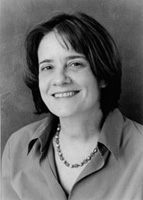 Wendy Salinger: Your first novel is loosely based on your own experience, while my memoir uses some fictional techniques to tell the story of my childhood. Do you think there's anything new in the current debate about truth in memoir, or is it just about fundamental ambiguities between genres? I mean, is there anything left to say about the James Frey scandal?
Wendy Salinger: Your first novel is loosely based on your own experience, while my memoir uses some fictional techniques to tell the story of my childhood. Do you think there's anything new in the current debate about truth in memoir, or is it just about fundamental ambiguities between genres? I mean, is there anything left to say about the James Frey scandal?
Continue reading "Wendy Salinger &Miranda Beverly-Whittemore: You write on the copyright page of Listen, "Because remembering is an act of the imagination, the only real name I've used in this book is my own." Reading that, I thought a lot about the responsibility of the writer when she takes on incidents from her own life. I first read Listen when it was still a novel entitled Victor Dying, and I know that it was a winding road for you to see the book as a memoir, and that in doing so, you knew you needed to give your family some degree of anonymity.
Although my novel has an entirely made-up plot, the jumping-off place for that plot was based in my real-life experience of being photographed by a close family artist friend. Because the real photographs of this friend have been misrepresented and misinterpreted by the religious right, I knew I had to be very cautious about separating the made-up photographs in my book from the real photographs in the world, and the photographer in my novel from the photographer in my life—for my sake, for the sake of my readership, and, perhaps most importantly, for the photographer and my family. I did that by making sure that everyone close to me who had the potential be hurt by my book's subject matter had the chance to read the book and talk to me about it. It was ultimately essential to me that I approached them. Not because I was asking their permission, but because they were fabulous resources.
In light of all that, what fascinates me about the James Frey stuff is that the debate was dumbed down to the lowest common denominator, that is, Oprah's berating of James Frey for "lying." A lot of good could have come out of all of this with some interesting discussion about blurred lines between genre, about what memoir is, about exactly why Oprah was so angry—what that says about her as a cultural bellwether. I get that she was embarrassed. But I also believe that Frey was punished for something that's a central issue in our country right now; our President lied to get us to war, for God's sakes. It's no surprise that this is what we're dealing with right now, culturally: Kaavya Viswanathan, JT Leroy, James Frey—I think they just happen to be the literary versions of the lying all around us. At least something's prompting a discussion about lying!
Miranda Beverly-Whittemore"
February 26, 2007
Edwin Thomas & C.C. Humphreys
![]()
When St. Martin's sent me two historical adventure novels, Treason's River by Edwin Thomas and Jack Absolute by C.C. Humphreys, I thought teaming the two authors up for a chat was a natural. Turns out they were way ahead of me: Thomas and Humphreys have been friendly for years. That set a great tone for their conversation here.
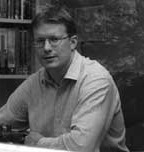 Edwin Thomas: Most historical authors (certainly including me) start with a historical period or person, and then fictionalise it. You've gone the opposite way and 'historicalised' a fictional character (Jack Absolute was originally a character in Sheridan's The Rivals). Does that alter the process of writing the books?
Edwin Thomas: Most historical authors (certainly including me) start with a historical period or person, and then fictionalise it. You've gone the opposite way and 'historicalised' a fictional character (Jack Absolute was originally a character in Sheridan's The Rivals). Does that alter the process of writing the books?
C.C. Humphreys: Writing Jack is a bit different, I suppose, than writing my other novels where it all comes purely from my head. I did have something to go on with Jack Absolute, both Sheridan's play and, especially, my performance in the role twenty years ago. So part of the fun of writing him—and he is huge fun to write!—is taking some of the situations that Sheridan's Jack, my acting Jack and indeed, Sheridan himself would have encountered and inventing whole new stories around them. To take a couple of examples: the love of theatre and of theatricality; the duelling (Sheridan fought a famous one, I've fought dozens). His family: one of my favourite characters, who appears in the second and third novels is Jack's father, Sir James (the play's Sir Anthony) Absolute, and my 'Mad Jamie' is every bit as bellicose as the play's Sir... only more so!
So fun, yes, to use some of the play's ideas as springboards—but they are only that. The joy is to take them to realms as yet uncharted—and then the novel writing process returns to normal: invent something, then the next something, then join them together!
When you first conceived your novels, did you have a character in mind and then seek a period to place him in? Or were you determined to write about the Napoleonic naval era and found a character to fit?
Edwin Thomas: I'd been wanting (and trying) to write about Nelson's navy for a number of years. In fact, most of my early attempts focussed on a character not a million miles away from Jack Absolute: a doughty, dashing, unstoppable hero who thrived on adventure, Errol Flynn and James Bond and Horatio Hornblower all rolled into one. He was meant to be extreme, to affectionately send up the heroic conventions of the genre, but he only really worked in an extreme (and extremely unrealistic) context. As I decided I wanted to be more historically faithful in the stories I told, I found he didn't really fit my needs any more. So I jettisoned him, and went to the other extreme of the heroic spectrum: Martin Jerrold.
October 16, 2006
Michael Largo & Lisa Cullen
![]()
Michael Largo, the author of Final Exits, an "illustrated encyclopedia of how we die," was psyched when he found out I wanted to pair him up for an Author2Author with Lisa Cullen to talk about her new book, Remember Me, a "lively tour of the new American way of death." You see, two decades, when Cullen's doctor warned him that he'd probably be dead in six months if he kept up his way of life, Cullen responded by pre-ordering his tombstone. When he didn't die, he recals, "the monument company threatened to grind my name off and sell it to someone else if I didn't pick it up. So I persuaded six friends to help me carry this monstrously awkward stone up to my filth floor walk-up apartment on St. Marks Place. This marker in my living room turned out to be the wildest 400 pound granite Post-It note money could buy. In fact, the heavy reality of it got me over the immortality mindset of my twenties and was ultimately a wake-up to modify many a harmful lifestyle."
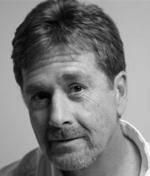 Michael Largo: Lifestyle, as I've discovered, is the real cause for nearly 50% of all deaths. How do we actually die? That is the question I wanted to know. Of course, the Center for Disease Control (CDC) puts out the top ten causes each year, but that is such a tablet of saccharin in the sea of data, some of which you'll find in Final Exits. While researching your book, did you find cause of death to be influential in burial choices?
Michael Largo: Lifestyle, as I've discovered, is the real cause for nearly 50% of all deaths. How do we actually die? That is the question I wanted to know. Of course, the Center for Disease Control (CDC) puts out the top ten causes each year, but that is such a tablet of saccharin in the sea of data, some of which you'll find in Final Exits. While researching your book, did you find cause of death to be influential in burial choices?
Continue reading "Michael Largo & Lisa Cullen"Lisa Cullen: I thought I ought to start by letting you know that Final Exits has been selected for admission to my family's library of bathroom books. Its quick, funny, bizarre, bite-size reads makes the book perfect for the smallest room of the house. I apologize if you had grander ambitions, but, to my family, this placement is in fact the highest honor... I must however admit I question your moorings. What kind of person knows that more than 500 people died between 1999 and 2003 from economy-class syndrome? Or that halitosis can lead to cancer? Or that "in 1987, Texan Walter Mitchell killed his wife because she was about to say the words 'New Jersey'"? Your tale about keeping a tombstone in your apartment only deepens my suspicions, friend.
But you pose a serious and interesting question. My first instinct was to answer no, that the cause of death did not seem to reflect upon the mode of burial among the people I profiled in my book who chose unusual and personal send-offs. After some reflection, however, I thought of the mother of three with cancer who chose a "green" burial in a nature preserve in South Carolina. I did not get to interview her before her passing, but it occurs to me that her unimaginable pain must have been eased somewhat by knowing she had chosen to go as one with nature. I think it would for me. And in the case of the Port Authority worker who died on 9/11, his empty casket was held in the mausoleum until his remains could be found.
Do you think the fact that a book like yours can exist means we Americans perceive death differently today? In other words, does our generation see humor in death? And if so, why now? The world just isn't so funny these days.
